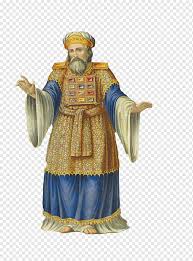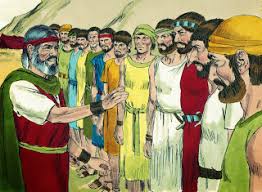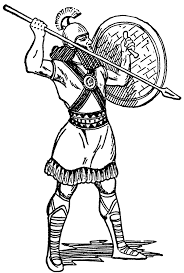Joshua 14:1-2 – These are the inheritances that the people of Israel received in the land of Canaan, which Eleazar the priest and Joshua the son of Nun and the heads of the fathers' houses of the tribes of the people of Israel gave them to inherit. Their inheritance was by lot, just as the Lord had commanded by the hand of Moses for the nine and one-half tribes.
In chapter 13, we were given a description of the division of the land east of the Jordan River. This land was given to the Transjordan tribes – Reuben, Gad and half of Manasseh.

The book of Joshua now goes on to describe the division of the official Promised Land (west of the Jordan River) among the remaining tribes. After a brief introduction in verses 1-5, the author will pause in his narrative and give us an update on the story of Caleb. The official record of land distribution will then resume in chapter 15.
The author begins with a statement that seems like a contradiction - we are told that the land was divided by a council, yet we are also told it was awarded by lot. Which was it? Could it be possible that both were used to determine the inheritance of the tribes?
Let's begin by examining the council.
Eleazar the priest was on the council because he represented God's authority. As evidenced by the recent victories in war, the nation of Israel was not directed by the earthly wisdom of men; it was governed by the will of God. Therefore, God would certainly have a representative on the council. Because he was a priest of God, he was considered honest, just and fair.
Joshua was on the council because he was the supreme authority in all civil matters relating to the nation. The people of Israel had already pledged their allegiance to him, so they would trust his decisions in this matter.
Ten representatives (one from each of the tribes who were going to split the land west of the river) were also selected for this committee. You can find their full names in Numbers 34:19-28. Obviously, Reuben and Gad did not have a representative as they had already received their inheritance.
It is important that we understand that these ten officials were not selected by popular vote. They were not chosen because of friendship with Joshua or kinship to Eleazar. There were specifically commissioned by God to perform the task of dividing the land.
Therefore, the people of the nation could be assured that no fraud or deceit was practiced in the division of the land. No matter what territory they wound up with (and no matter what its size), they could be assured that it was the exact land that God chose to give them.
Now back to our original question – how can it be said that the land was divided by a council and yet by lot?
In our last post we pointed out that God does not give gifts that are one-size-fits-all. He gives specific gifts to specific people. In this case, God had a specific region that he desired to give to each unique tribe. For instance, some tribes were going to wind up on the shore of the Mediterranean Sea, where they could facilitate shipping and trading. Some tribes would inherit land high in the mountains, which were rich in timber and ore. Some would inherit foothills perfect for vineyards. Others would have extremely fertile land perfect for farming and grazing.
The lot was used to determine the general area/location of each specific tribe (by the sea, in the mountains, south toward the desert, etc).
Although we are not specifically told how the lot was cast, most scholars believe it was done according to the pattern that was used during the lifetime of Moses (Numbers 27:21, Deuteronomy 17:9).

This meant that the lot was cast by the priest (Eleazar) at the entrance to the tabernacle. With the council in attendance, two vessels were prepared for the casting of the lot. One held the names of the tribes, while the other held descriptions of the various locations.
As civil leader of the nation, Joshua would pull the name of a tribe from one vessel. He would then approach Eleazar and request that he ask the Lord to assign them a location. After consulting with the Lord, Eleazar would draw a lot from the second vessel, which determined the area/location for that tribe with the ten representatives witnessing the procedure. Thus, the location of each tribe was determined by the will of God through the lot.
The role of the council/committee was to determine the borders of each territory that had been determined by God through the lot. The size or number of people in the tribe as well as their individual economic strengths/talents had a great deal to do with their decisions.
For example, the lot placed the tribe of Benjamin right next to the tribe of Judah, with Judah being much bigger (having a greater population). It was up to the council to determine where the border would fall between these two tribes. Based on population and other factors, they would determine which cities, pastures, bodies of water, etc fell into the territory of each tribe.
This explains how the land was divided by lot (which determined the general location of each tribe) as well as by the council (which determined the actual borders of each tribe, based on need and strengths).
This unique method of division prevented any jealousy, animosity or quarrels among the tribes in regard to the quality of their land, the quantity of their inheritance or the number of Canaanites still living in their new territory.
As we will see in the next chapter, some of these borders were adjusted as the land was conquered (Numbers 26:53, 33:54). We will also see in the next chapters that the casting of the ten lots did not all occur on the same day. The tribe of Judah drew the first lot and it seems as though they were settled in their inheritance before others were drawn. We will also see that the camp/headquarters of Israel was moved from Gilgal to Shiloh.
Joshua 14:3-4 – For Moses had given an inheritance to the two and one-half tribes beyond the Jordan, but to the Levites he gave no inheritance among them. For the people of Joseph were two tribes, Manasseh and Ephraim. And no portion was given to the Levites in the land, but only cities to dwell in, with their pasture lands for their livestock and their substance.
This is the third time that note has been made of the fact that the Levites did not inherit a specific territory. It is also yet another reminder that Reuben, Gad and half of Manasseh received land east of the Jordan. No further comment is necessary on these verses because we have already examined them at length.
Joshua 14:5 – The people of Israel did as the Lord commanded Moses; they allotted the land.
The process of dividing the land into general locations was probably more difficult than it seems. In our day, we would send a drone over the territory, feed the data into a computer and wind up with a detailed map that showed all the specifics of the land. And we could do it all from the comfort of our own home!

But back in that day, the only option was to send groups of men out with pencil and paper to lay eyes on the land. They had to manually chart thousands and thousands of acres of land, making note of the landscape (hills, mountains, valleys), the resources (vineyards, standing timber, mines, pasture lands, etc) and bodies of water. They would also have recorded the number, size and value of the major cities. No doubt note was also made of how many Canaanites were still occupying these territories.
We are not told how much time was taken up in the task of examining the land. However, we know that it did happen: the divisions were made, accepted by the council/committee, placed into the vessel and set before the priest so the lot could be cast as commanded by God.
Joshua 14:6 – Then the people of Judah came to Joshua at Gilgal. And Caleb the son of Jephunneh the Kenizzite said to him, "You know what the Lord said to Moses the man of God in Kadesh-barnea concerning you and me."
The author interrupts his account of the division of the land with a narrative about Caleb, son of Jephunneh, of the tribe of Judah.
Basically, Caleb is about to stake a personal claim on the city of Hebron and its surrounding territory. The claim that Caleb is making is based on a verbal promise from Moses, who has now been dead for quite some time.
At this point, what we want to understand is the time-frame connected to Caleb's request. The author tells us 'then' Caleb and some of the men of Judah came to see Joshua. What time-period is the author referring to?
Keep in mind that Western cultures (like ours) always present events in chronological order. Because of this, you and I would assume that Caleb approached Joshua with his request just as the lots were being cast at the tabernacle.
However, writers in ancient Eastern cultures did not write that way. They often presented information by lumping relevant people, ideas or events together, regardless of when they occurred. Therefore, we cannot assume that Caleb's request occurred when the lots were being cast. It is probably mentioned here simply because it relates to the division of the land west of the Jordan.
In fact, as we examine his claim, it becomes very clear that this request was made much, much earlier than the casting of the lots. As we will see, circumstances dictate that it had to have occurred during the years of warfare, before the period of rest and before God prodded Joshua to divide the land.
So, at some point during the period of active warfare, Caleb approaches Joshua at the camp in Gilgal along with several of the other leaders of Judah. He proceeds to bring up a conversation that occurred just after Israel refused to enter the Promised Land the first time.
Joshua 14:7-9 – "I was forty years old when Moses the servant of the Lord sent me from Kadesh-barnea to spy out the land, and I brought him word again as it was in my heart. But my brothers who went up with me made the heart of the people melt; yet I wholly followed the Lord my God.
As you recall, Moses sent 12 men to spy out the Promised Land before Israel entered it. When they returned, Joshua and Caleb encouraged the people to move forward immediately, because God was giving them a good land, flowing with milk and honey.

But ten of the spies brought back an evil report of a land that had well-trained troops and fortified walls. They were particularly afraid of the giants which they saw in the land (Numbers 13:33). They discouraged Israel and blasphemed God by saying there was no hope of conquering the land.
During this whole discussion between Israel and the spies, Joshua and Caleb argued numerous times that Israel should be courageous and trust in God. He had promised them the land; there was no reason to fear the people of Canaan or the giants who lived there:
Numbers 14:9 – Only do not rebel against the Lord. And do not fear the people of the land, for they are bread for us. Their protection is removed from them, and the Lord is with us; do not fear them.
It has been speculated that during these discussions, when the ten spies made mention of the Anakim (giants) in order to frighten the people, Caleb responded by saying that he would attack the giants of Hebron himself, and keep their land as his inheritance, provided the rest of the Israelites would agree to step out in faith and enter the land.
Israel refused to take Caleb up on his offer to slay the giants of Hebron. However, God heard it, and he rewarded Caleb's faith by promising him and his descendants 'the land on which your foot has trodden' for an inheritance forever:
Joshua 14:9 - And Moses swore on that day, saying, 'Surely the land on which your foot has trodden shall be an inheritance for you and your children forever, because you have wholly followed the Lord my God.'"
Although the city of Hebron is not specifically mentioned by Moses, the context of the conversation implies this was the case (Numbers 14:24. See also Deuteronomy 1:36). Furthermore, Joshua (who was present at the time) clearly believes and acknowledges that God's promise to Caleb referred to the city of Hebron.
This 45-year-old promise is the reason Caleb has come to see Joshua. Despite the long delay, he still plans to slay the giants of Hebron and take their land as his possession. What remarkable faith he has!
Joshua 14:10 – "And now, behold, the Lord has kept me alive, just as he said, these forty-five years since the time that the Lord spoke this word to Moses, while Israel walked in the wilderness. And now, behold, I am this day eighty-five years old."
Let's pause and think about this meeting for a moment.
We have Joshua and Caleb, the two oldest men in Israel and the only survivors from their generation. The mere sight of them must have been a testimony to the younger generation because their very presence was proof of God's judgment concerning the unbelieving generation (who were all dead), as well as his gracious promises to those who put their faith in his word.

And despite the passage of more than four decades, Joshua and Caleb were just as strong, just as energetic, just as mentally sharp, and just as youthful as they had been in their prime. Their youth was obviously a blessing from God for their faith in his promises.
As we think about Joshua, Caleb and the other ten spies, we are reminded that each of us carries the ability to influence others.
One of the ways we influence others is through our words. The effects of what we speak can be very profound. The ten spies are a perfect example. Their testimony to Israel was one of fear and defeat. Despite the fact that God had never broken a promise to them, they did not believe he would take them into the land and help them defeat the Canaanites and the Anakim. The fear, worry and unbelief that they spoke infected the rest of the nation like a plague! As a result, the men of that generation died while wandering in the wilderness.
In the same way, your words can influence those around you. This might be a good time to stop and consider what you are saying. Are your words building people up in their faith? Are you using your daily conversations to testify about God keeping his promises to you? Are you dispelling fear and doubt in those you speak to at work, school or out in the public arena? If not, you should consider changing your ways:
Proverbs 18:21 - Death and life are in the power of the tongue: and they that love it shall eat the fruit thereof.
We can also influence those around us through our actions. Caleb was so confident about defeating the giants, he set up that special meeting with Joshua, taking the leaders of Judah with him. After receiving Joshua's approval, he moved forward in faith and confidence to take Hebron, even though he was 85 years old! His actions sent a message to all of Israel – if Caleb can slay the giants with the help of God at age 85, what is possible in my life? Why do I fear the giants?
Consider your own actions for a moment. What are you doing to build faith in your family and friends? Are you fearlessly praying? Are you voting? Are you financially supporting the gospel? Passing out copies of God's word? Debating issues in the public sector that display your faith in God? If not, why not look for ways to be involved?
Joshua 14:11 – "I am still as strong today as I was in the day that Moses sent me; my strength now is as my strength was then, for war and for going and coming."
Caleb adamantly asserts that he is just as strong and virile at 85 years of age as he was at 40, due to the mercy of God. Therefore, despite his age, he is still ready and willing to march forth and fight with the giants of Hebron.
In doing so, he will glorify God and create a testimony for the rest of the nation. He will also give God an opportunity to bless him as he steps out in faith to take on the enemy.
Joshua 14:12-13 – "So now give me this hill country of which the Lord spoke on that day, for you heard on that day how the Anakim were there, with great fortified cities. It may be that the Lord will be with me, and I shall drive them out just as the Lord said." Then Joshua blessed him, and he gave Hebron to Caleb the son of Jephunneh for an inheritance.
It is obvious from these verses that the city of Hebron and its surrounding territory had not yet been subdued by Israel as they were still full of terrifying giants. This confirms the fact that the meeting between Joshua and Caleb did not take place during the time when the lots were cast; it occurred as Israel was still gaining possession of the land.

In fact, it must have occurred just before the battle against the five kings of the south, as recorded in Joshua 10:36-37. Although the account of the war in chapter 10 does not specifically mention Caleb, we are told in Joshua 15:13-14 that Caleb was the man who killed the giants of Hebron.
But let's not get ahead of ourselves. In the initial meeting between Joshua, Caleb and the men of Judah, Caleb is basically asking Joshua for two things:
One, that he be given the chance to fight/slay the giants of Hebron. This was an opportunity that he should have had 40+ years earlier, and despite the long delay, he never gave up hope that he would one day have the chance to defeat them in battle.
This shows that Caleb had a promise from God down deep in his heart and he wasn't going to let it go, no matter how long it took! I am sure there were days when it seemed like his opportunity was never going to come, but he didn't let his faith fail. Despite the circumstances, he never gave up.
I think that he kept that promise alive by meditating on it all the years that Israel wandered in the wilderness. I bet he laid in bed at night, making battle plans and rehearsing his victory as he fell asleep under the stars. And now his faith was being rewarded with that long awaited opportunity!
Two, Caleb was also asking for an assurance from Joshua that when he slew the giants of Hebron, the land would be his personal inheritance.
Up until this point, all the land that was conquered was waiting to be divided up among the nation. Caleb did not want Hebron to get lumped into the general territory of one of the tribes. That particular piece of real estate had been promised to him by God and he wanted to make sure there would be no question of ownership after he conquered it.
After listening to his request, Joshua blessed Caleb. In other words, he acknowledged his right to the city of Hebron, consented to his making a conquest of it, and also prayed for his friend and colleague to have favor with God, who would give him victory in this endeavor.
All of these interactions took place in the presence of the men of Judah, who served as witnesses to Caleb's right to Hebron. (Also, because Caleb was the representative of Judah on the council that divided the land, it was best to have these witnesses so that people did not suspect anything underhanded was happening when it came time to divide the land.)
Joshua 14:14 – Therefore Hebron became the inheritance of Caleb the son of Jephunneh the Kenizzite to this day, because he wholly followed the Lord, the God of Israel.
Those who follow the Lord with all their heart, soul, mind and strength are always blessed of God. They will always be victorious in the kingdom of God and they will always serve as a righteous testimony not only to those around them, but to future generations as well. Hallelujah!
Joshua 14:15 – Now the name of Hebron formerly was Kiriath-arba (Arba was the greatest man among the Anakim).� And the land had rest from war.
Kiriath-arba literally means 'the city of the four'. This city is believed to be so named because of four exceptionally powerful giants (Anakim) who either founded the city or conquered it. It is further believed that the four were three brothers along with their father:
Numbers 13:22 And they ascended through the South, and came unto Hebron; where Ahiman, Sheshai, and Talmai, the children of Anak, were. (Now Hebron was built seven years before Zoan in Egypt.)
As we will see in our study of chapter 15, Caleb will indeed be victorious over these giants.
The writer ends this chapter by coming full circle back to the time when Israel had finished its general conquest of the land and was enjoying a period of rest, when God prodded Joshua to assemble the council and divide the land.
Let me offer you some encouragement:
God never, ever fails to keep any of his promises. However, their fulfillment isn't always instantaneous. The entire book of Joshua is an example of this.
God had promised to give Israel the land and he absolutely did - but not overnight. The Israelites had to fight, rest and fight again on numerous occasions over a 5-7 year period. During that entire time, God fought alongside his people, protecting them, providing for them, giving them wisdom and assisting them in battle until the promise was fulfilled.
The story of Caleb presents us with another example. God had promised to give Caleb the territory of Hebron, the land of the four formidable giants. Due to the unbelief of Israel, that promised was delayed 45 years.
But God's promise was not affected by Israel's folly. God went so far as to give Caleb miraculous youth until such time as he was able to grant him the promise.
What promise(s) has God given to you? Are you still holding to them tightly, dreaming about them at night and waiting on God to make them possible? If you have a promise from God that seems to be taking forever, I strongly encourage you to stay in faith, because your story isn't over yet – God will prevail in your situation!
Let me offer you some relief:
We sometimes have a tendency to think that God is unable to fulfill a promise because of a mistake or failure on our part. As a result of that kind of thinking, we give up on the promise God gave us.
 Do you realize that that kind of thinking makes you greater and more powerful than God? Seriously – think about it. If you have the ability to thwart or demolish the promises/plans of God by simply making a mistake, what does that say about God?
Do you realize that that kind of thinking makes you greater and more powerful than God? Seriously – think about it. If you have the ability to thwart or demolish the promises/plans of God by simply making a mistake, what does that say about God?If the enemy has duped you into thinking that way, let me give you some relief – God is bigger, greater and more powerful than your mistakes and he is well able to keep the promises that he made to you!
So stop believing the lies of satan. Ask the Lord for forgiveness and allow him to restore hope within your soul for the thing he has promised to you. Once you get it back, never let go until you experience its fulfillment.
Let me offer you some strength:
What is strength? Webster's dictionary defines it as the ability to do or to bear; the capacity for exertion or endurance whether physical, intellectual or moral.
Given this definition, we can conclude that:
- God gave Joshua the strength to lead Israel over the Jordan, into the land, and through 5-7 years of constant warfare.
- God gave Caleb miraculous strength and youth so he could defeat the giants.
- God will also give you the mental, physical, emotional and financial strength you need in order to fulfill the destiny that he has designed for you!
